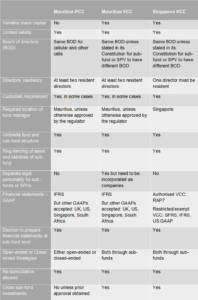The Variable Capital Companies (VCC) Act 2022 is Mauritius’ latest game-changing legislation, further bolstering its status as a reputable international financial centre (IFC) and transforming its investment fund landscape. In this article, we provide a detailed overview of the VCC Act and what it means for our clients.
Gazetted on 15 April 2022, the VCC Act seeks to provide the legal framework that will govern, among other things, the set-up and operations of VCCs in Mauritius.
VCCs can be set up as a standalone investment fund or structured as an umbrella fund with underlying sub-funds and/or special purpose vehicles (SPVs) holding segregated portfolios. The umbrella fund may operate as both a collective investment scheme (CIS) and a closed-end fund at the same time, while the SPV can only operate as an investment holding or special purpose company. A VCC may be used as a vehicle for both traditional funds and alternative funds, including hedge, private equity, real estate and infrastructure.
What will VCCs bring to the Mauritius IFC?
The enactment of the VCC legislation will enhance Mauritius’ competitiveness as a domicile for investment funds by introducing a tailored corporate structure that dispenses with elements of existing company law that were not conducive to investment funds.
While VCC structures are common in major IFCs, most notably Singapore, Mauritius had been leveraging the use of its Protected Cell Company (PCC), which enables the creation of one or more cells for the purpose of segregating and protecting cellular assets. PCCs are commonly used to cater for varied investment strategies; however, they are limited in terms of flexibility and the legal liability they can offer to investors.
In contrast, a VCC boasts an impressive palette of additional features, making it very attractive to fund promoters and investors:
- A VCC can consist of CIS funds and closed-end funds within one structure
- A VCC may issue shares of varying amounts and/or issue shares for payment of calls as agreed between its shareholders
- The share capital of a VCC will always be equal to its net assets, thereby providing flexibility in the increase and reduction of capital
- A VCC allows for flexibility regarding the distribution and payment of dividend out of capital rather than profits
- A sub-fund of a VCC may invest in other sub-funds of the same VCC
- In a VCC, investment portfolios are segregated through the sub-funds and SPVs whereby assets and liabilities can be clearly segregated and ring-fenced
- VCCs may sue or be sued in respect of particular sub-fund, hence mitigating the contagion risk of the whole entity
The winding up of individual sub-funds does not automatically initiate the winding up of the entire VCC
Particularly of note is the fact that a sub-fund and an SPV may elect to have a separate legal personality from the umbrella VCC, such that the assets and liabilities of one sub-fund or SPV are segregated from those of another. As such, the liabilities of a sub-fund under an umbrella VCC can only be discharged from its assets and not out of the assets of the other sub-funds or SPVs.
A VCC can also prove to be a cost-effective solution in that it allows for economies of scale given that it can appoint one CIS manager, CIS administrator, custodian or other service provider for all of its sub-funds. So instead of setting up several individual funds, a fund promoter may set up one VCC with several sub-funds, thereby saving on operational costs.
In a similar vein, thanks to consequential amendments brought to existing legislations through the VCC Act, economies of scale are enabled in relation to AML/CFT requirements as well. For instance, a VCC may appoint a single money laundering reporting officer (MLRO) or compliance officer for all of its sub-funds.
For more detail on the VCC Act 2022, please click here to view our factsheet.
How do Mauritius VCCs compare to other similar structures?
Undoubtedly, VCCs in Mauritius are expected to usurp PCCs over time, as promoters and investors gravitate towards the greater flexibility and cost-effectiveness that VCCs offer.
We have highlighted hereunder some of the major differences between the Mauritius VCC and PCC structures. We’ve also included a comparison with a Singapore VCC, which is heralded by investors as one of the most flexible VCC structures.

The timely launch of the VCC could act as a springboard for the Mauritius IFC to re-affirm its status as an innovative jurisdiction of repute and choice. The flexibility and cost efficiency of the VCC structure will undoubtedly prove to be an asset for the Mauritius IFC and garner much interest from investors.
Speak to IQ-EQ
IQ-EQ Mauritius is proud to have provided input and comments to the draft VCC statutes through various industry forums, and would be happy to assist in setting up your next venture as a VCC. Our services include structuring, working on the documentation in collaboration with counsel, and preparation and submission of the application for licensing.
With the effective date of the VCC Act yet to be proclaimed, we are currently awaiting the FSC Rules and Regulations for more clarity on the licensing of the VCC. We will keep our clients and partners updated as we know more.
In the meantime, if you have any questions or wish to discuss structuring a VCC in Mauritius, please don’t hesitate to contact me.






